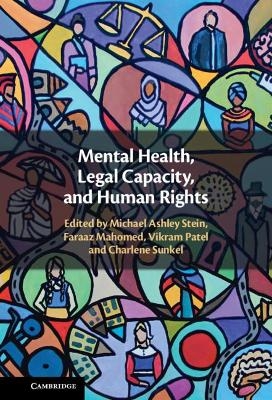
Mental Health, Legal Capacity, and Human Rights
Cambridge University Press (Verlag)
978-1-108-83885-6 (ISBN)
Since adoption of the Convention on the Rights of Persons with Disabilities and the interpretive General Comment 1, the topic of legal capacity in mental health settings has generated considerable debate in disciplines ranging from law and psychiatry to public health and public policy. With over 180 countries having ratified the Convention, the shifts required in law and clinical practice need to be informed by interdisciplinary and contextually relevant research as well as the views of stakeholders. With an equal emphasis on the Global North and Global South, this volume offers a comprehensive, interdisciplinary analysis of legal capacity in the realm of mental health. Integrating rigorous academic research with perspectives from people with psychosocial disabilities and their caregivers, the authors provide a holistic overview of pertinent issues and suggest avenues for reform.
Michael Ashley Stein is the Executive Director of the Harvard Law School Project on Disability, and a visiting professor at Harvard Law School. Considered one of the world's leading experts on disability law and policy, Stein participated in the drafting of the UN Convention on the Rights of Persons with Disabilities; works with disabled peoples' organizations and non-governmental organizations around the world; actively consults with governments on their disability laws and policies; advises an array of UN bodies and national human rights institutions; and has brought landmark disability rights litigation globally. Faraaz Mahomed is a research associate at the Harvard Law School Project on Disability, and a visiting research fellow at the Centre for Applied Legal Studies, University of the Witwatersrand, Johannesburg, South Africa. Mahomed self-identifies as a person with a psychosocial disability and has worked in mental health practice, in community-based as well as institutionalized settings, as a clinical psychologist. He now works in the human rights field, supporting rights-based approaches to mental health in Africa at the Open Society Foundations. He received a Fulbright scholarship in 2008. Vikram Patel is The Pershing Square Professor of Global Health in the Department of Global Health and Social Medicine at Harvard Medical School. Vikram's work has focused on the burden of mental health problems, their association with social disadvantage, and the use of community resources for their prevention and treatment. He has been awarded the Chalmers Medal, the Sarnat Prize, the Pardes Humanitarian Prize, an honorary OBE, and the John Dirk Canada Gairdner Award in Global Health for his leading work in the field. Charlene Sunkel is the Founder and CEO of the Global Mental Health Peer Network. She is a global mental health lived-experience advocate, and she has authored or co-authored a number of papers related to mental health and human rights. Sunkel also serves on or advises several international boards and committees.
Introduction: A 'paradigm shift' in mental health care Faraaz Mahomed, Michael Ashley Stein, Vikram Patel and Charlene Sunkel; 1. The alchemy of agency: reflections on supported decision-making, the right to health and health systems as democratic institutions Alicia Ely Yamin; 2. Redefining international mental health care in the wake of the COVID-19 pandemic Benjamin A. Barsky, Julie Hannah and Dainius Pūras; 3. Reparation for psychiatric violence: a call to justice Tina Minkowitz; 4. Divergent human rights approaches to capacity and consent Gerald L. Neuman; 5. From fairy tale to reality: a practical legal approach towards the global abolition of psychiatric coercion Laura Davidson; 6. The “fusion law” proposals and the CRPD John Dawson and George Szmukler; 7. Contextualising legal capacity and supported decision making in the Global South – Experiences of homeless women with mental health issues from Chennai, India Mrinalini Ravi, Barbara Regeer, Archana Padmakar, Vandana Gopikumar and Joske Bunders; 8. The potential of the legal capacity law reform in Peru to transform mental health provision Alberto Vásquez Encalada; 9. Advancing disability equality through supported decision making: the CRPD and the Canadian constitution Faisal Bhabha; 10. Decisional autonomy and India's Mental Healthcare Act, 2017: a comment on emerging jurisprudence Soumitra Pathare and Arjun Kapoor; 11. Towards resolving damaging uncertainties: progress in the United Kingdom and elsewhere Adrian D. Ward; 12. “The revolution will not be televised”: recent developments in mental health law reform in Zambia and Ghana Heléne Combrinck and Enoch Chilemba; 13. Supported decision-making and legal capacity in Kenya Elizabeth Kamundia and Ilze Grobbelaar-du Plessis; 14. Seher's “circle of care” model in advancing supported decision making in India Bhargavi V. Davar, Kavita Pillai and Kimberly LaCroix; 15. The Swedish personal ombudsman: support in decision-making and accessing human rights Ulrika Järkestig Berggren; 16. Strategies to achieve a rights based approach through WHO Quality Rights Michelle Funk, Natalie Drew Bold, Joana Ansong, Daniel Chisholm, Melita Murko, Joyce Nato, Sally-ann Ohene, Jasmine Vergara and Edwina Zoghbi; 17. The Clubhouse Model: A framework for naturally occurring supported decision making Joel D. Corcoran, Cindy Hamersma and Steven Manning; 18. Mind the gap: researching “alternatives to coercion” in mental health care Piers Gooding; 19. Psychiatric advance directives and supported decision-making: preliminary developments and pilot studies in California Christopher Schnieders, Elyn R. Saks, Jonathan Martinis and Peter Blanck; 20. Community-based mental health care delivery with partners in health: a framework for putting the CRPD into practice Stephanie L. Smith; 21. Lived experience perspectives from Australia, Canada, Kenya, Cameroon and South Africa – conceptualizing the realities Charlene Sunkel, Andrew Turtle, Sylvio A Gravel, Iregi Mwenja and Marie Angele Abanga; 22. In the pursuit of justice: advocacy by and for hyper-marginalized people with psychosocial disabilities through the law and beyond Lydia X. Z. Brown and Shain M. Neumeier; 23. The Danish experience of transforming decision-making models Dorrit Cato Christensen; 24. The use of patient advocates in supporting people with psychosocial disabilities Aikaterini Nomidou; 25. Users' involvement in decision-making: lessons from primary research in India and Japan Kanna Sugiura; 26. Involvement of people with lived experience of mental health conditions in decision-making to improve care in rural Ethiopia Sally Souraya, Sisay Abyaneh, Charlotte Hanlon and Laura Asher.
| Erscheinungsdatum | 23.08.2021 |
|---|---|
| Zusatzinfo | Worked examples or Exercises |
| Verlagsort | Cambridge |
| Sprache | englisch |
| Maße | 157 x 236 mm |
| Gewicht | 810 g |
| Themenwelt | Geisteswissenschaften ► Psychologie ► Klinische Psychologie |
| Recht / Steuern ► Allgemeines / Lexika | |
| Recht / Steuern ► EU / Internationales Recht | |
| Recht / Steuern ► Öffentliches Recht ► Völkerrecht | |
| Recht / Steuern ► Privatrecht / Bürgerliches Recht ► Medizinrecht | |
| ISBN-10 | 1-108-83885-5 / 1108838855 |
| ISBN-13 | 978-1-108-83885-6 / 9781108838856 |
| Zustand | Neuware |
| Informationen gemäß Produktsicherheitsverordnung (GPSR) | |
| Haben Sie eine Frage zum Produkt? |
aus dem Bereich


